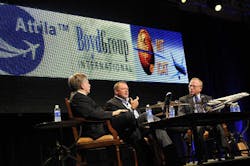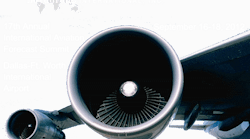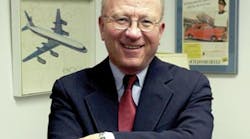EVERGREEN, Colo., Aug. 29, 2012 (GLOBE NEWSWIRE) -- This is the conclusion of the Airports:USA forecast that will be presented at the 17th Annual Boyd Group International Aviation Forecast Summit, September 16-18 in Dallas/Fort Worth.
Boyd Group International predicts that 2012 will clock in at approximately 740 - 745 million enplanements, at or even slightly below 2011. Because airlines are restructuring to accommodate higher fuel costs, capacity will be carefully adjusted to capture maximum revenue per seat. In the second half of 2012, for example, airlines will offer seven million fewer seats, and nearly three percent fewer departures than in 2011. "The fact is that some portions of today's air traffic is no longer cost-compensatory ? a situation that is permanent," according to the forecast. "The outcome will be a US air transportation system that actually will provide stronger global air access focused at fewer airports, both hubsite and non-hubsite."
GDP and population can no longer be fully relied upon as indicators of future air passenger demand. Michael Boyd, Chairman of the Colorado-based consulting firm noted, "The raw economics of flying airliners now dictate that carriers match capacity to only the sectors of demand that can provide an adequate return on investment. That means slower airport growth than traditionally experienced."
Key findings of the Airports:USA forecast which will be covered at the Summit:
Top Growth Airports. Atlanta will experience the most passenger growth between 2012 and 2017, with an additional 5.5 million enplanements, followed by New York/JFK at 2.6 million. Third place is a virtual tie between Dallas/Fort Worth and Charlotte, which will experience an additional 2.5 million. The Atlanta data is particularly interesting, in that the forecast indicates an initial decline in enplanements in 2013-2014 due to the Southwest acquisition of AirTran.
Increasing Importance of International Flows. By 2017, over 27% of all US passengers ? 217 million enplanements - will be directly or indirectly the result of international travel. "Economic health of a region will be affected by the ability for consumers to get to Shanghai, not Orlando," the forecast predicts. The forecast session at the Summit will review the new air service metrics that airports will need to consider in the future. "Airlines will rank airport markets by revenue-generation, not passenger volumes."
RJ Retirements - A Positive Dynamic. At many communities, the forecast indicates that the replacement of 50-seat jets with larger airliners will actually increase ridership as more seats are added without reduction in hub-feed frequencies. Even for airports that lose service due to these fleet changes, the overall outcome in many cases will still be positive. The forecast will review the process of "regionalization," where most communities that lose local flights will ultimately have the economic benefit of access to much stronger service alternatives within a ninety-minute drive - or less.
Obsolete Federal Subsidy Schemes. The forecast concludes that Essential Air Service and the Small Community Air Service Development Program (SCASDP) have become largely detrimental to the national air transportation system because they are based on the inaccurate assumption that small communities must have local air service, when in fact regionalized access may be far superior. At the Summit, data will be presented to show how these obsolete schemes too often encourage service that is counter to consumer trends and interferes with market forces. "Once valuable, the SCASDP program has long since run its course," the forecast points out, further noting that "much of the funds are either awarded to communities with no chance of recruiting service, or are applied to support low-frequency travel/vacation flights, which is fine, but does little to resolve the main challenge, which is to re-connect regions with the rest of the national transportation system."
Presentations From Aviation Leaders. The annual Boyd Group International Aviation Forecast Summit provides futurist data and business intelligence, as well as discussions with key airline and aviation leaders, including Gary Kelly - CEO Southwest Airlines, Scott Kirby, President US Airways, Dave Barger - CEO JetBlue, Ben Baldanza - CEO Spirit, David Cush - CEO Virgin America, Dr. Chi Zhihang - VPAir China, Paul Jacobson- CFO Delta Air Lines,David Neeleman - CEOAzul Brazilian Airlines, Chuck Schubert -VP Network Planning American Airlines, Steven Udvar-Hazy - CEO Air Lease Corp. Plus: senior executives from Airbus, Boeing, Bombardier, ATR, Mitsubishi and Embraer.
Dallas/Fort Worth International Airport ? one of North America's emerging Global Portals - is the host of the 2012 Summit, which begins on Sunday September 16 and wraps up on the afternoon of September 18.
More information and on-line registration are found at www.AviationForecastSummit.com
The Boyd Group, Inc. logo is available at http://www.globenewswire.com/newsroom/prs/?pkgid=4857
Copyright 2012 GlobeNewswire, Inc.All Rights Reserved




